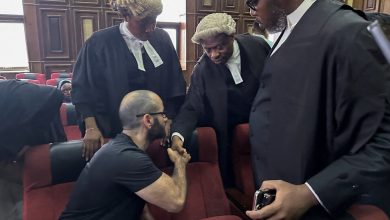Justice Dept. Sues Arizona Over Voting Restrictions

The Justice Department sued Arizona on Tuesday over a new state law requiring proof of citizenship to vote in a presidential election, saying the Republican-imposed restrictions are a “textbook violation” of federal law.
It is the third time the department under Attorney General Merrick B. Garland has challenged a state’s voting law and comes as Democratic leaders and voting rights groups have pressed Mr. Garland to act more decisively against measures that limit access to the ballot.
Arizona’s law, which Gov. Doug Ducey, a Republican, signed in March, requires voters to prove their citizenship to vote in a presidential election, like showing a birth certificate or passport. It also mandates that newly registered voters provide a proof of address, which could disproportionately affect people with limited access to government-issued identification cards. Those include immigrants, students, older people, low-income voters and Native Americans.
“Arizona has passed a law that turns the clock back by imposing unlawful and unnecessary requirements that would block eligible voters from the registration rolls for certain federal elections,” Kristen Clarke, the assistant attorney general of the Justice Department’s civil rights division, told reporters on Tuesday.
Ms. Clarke said that by imposing what she described as “onerous” requisites, the law “constitutes a textbook violation” of the National Voter Registration Act, which makes it easier to register to vote. The department said the law also ran afoul of the Civil Rights Act of 1964 in asking election officials to reject voter registration forms based on errors or omissions that are not relevant to a voter’s eligibility.
As of March, 31,500 “federal only” voters could be prevented from voting in the next presidential election under the new requirements if state officials are unable to track down their information in time to validate their ballots.
Some voting rights groups contend that the number of affected voters could be even greater. But even a few thousand fewer votes could be decisive in Arizona, one of the most closely contested battleground states: In 2020, Joseph R. Biden Jr. defeated President Donald J. Trump in Arizona by about 10,000 votes.
A spokesperson for Mr. Ducey did not immediately respond to requests for comment. When he signed the bill in March, Mr. Ducey said the law, expected to take effect in January, was “a balanced approach that honors Arizona’s history of making voting accessible without sacrificing security in our elections.”
Arizona has been at the center of some of the most contentious battles over the 2020 election. Six months after the election, its Republican-led Senate authorized an outside review of the election in Maricopa County, an abnormal step that quickly devolved into a hotbed for conspiracy theorists. The state has also passed multiple laws that impose new restrictions to voting.
Even before the Republican-controlled Legislature passed the measure, existing state law required all voters to provide proof of citizenship to vote in state elections. Federal voting registration forms still required voters to attest that they were citizens, but not to provide documentary proof.
In 2013, the Supreme Court upheld that law but added that Arizona must accept the federal voter registration form for federal elections. That essentially created a bifurcated system in Arizona that would require documented proof of citizenship to vote in state elections but allow those simply registering with the federal voter registration form the ability to vote in federal elections.
The new law could threaten the registrations of those voters, preventing tens of thousands of them from casting a ballot in presidential elections, voting rights groups contend.
“There’s certainly going to be some people in Arizona that are not going to be able to vote under the proof-of-citizenship requirement,” said Jon Greenbaum, the chief counsel for the nonpartisan Lawyers’ Committee for Civil Rights Under Law and a former Justice Department lawyer.
While the new law would have sprawling consequences for many groups, local election officials have noted that delivering documentary proof of citizenship can be especially hard among Native American populations, which were key to helping flip Arizona to Mr. Biden in 2020.
“You may have folks who were born on reservations who may not have birth certificates, and therefore may find it very difficult to prove citizenship on paper somehow,” said Adrian Fontes, the former election administrator for Maricopa County and a current Democratic candidate for secretary of state. “Things of this nature have always been of great concern for election administrators in Arizona.”
Shortly after taking office, Mr. Garland announced an expansion of the department’s civil rights division in response to a wave of laws introducing new voting restrictions after the 2020 election.
In June 2021, the department sued Georgia over its sweeping new voting law that overhauled the state’s election administration and introduced a host of restrictions to voting in the state, especially voting by mail. In November, the department sued Texas over a provision limiting the assistance available to voters at the polls.
Marc Elias, a Democratic elections lawyer who represented a group that filed a suit against Arizona earlier this year, said he was relieved to see the department follow through on Mr. Biden’s pledge last year to counter a threat from Republican-sponsored state laws he called the “most significant test to democracy” since the Civil War.
“Adding the voice and authority of the United States is incredibly helpful to the fight for voting rights,” Mr. Elias said in an interview.




